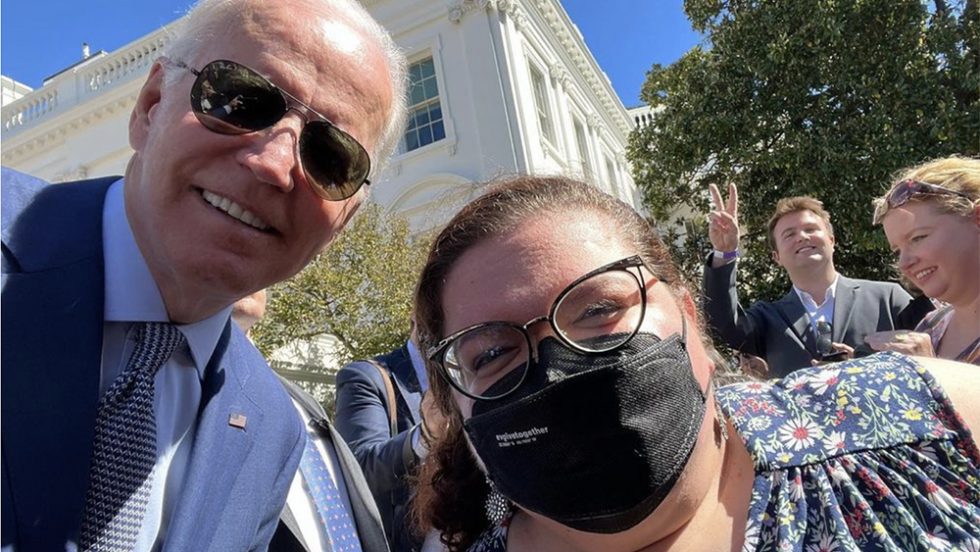
Emily Ladau '13 has been speaking up for people with disabilities for most of her adult life.
The internationally known disability rights activist, writer and speaker has authored a book on being an ally to those in the disability community, hosts a podcast on disability issues, has written for a slew of national media outlets on the topic, and is a member of Adelphi’s board of trustees.
But even Ladau felt starstruck after she opened an invitation that arrived this past summer. President Joe Biden invited Ladau to be a guest at the White House to help celebrate the 32nd anniversary of the Americans with Disabilities Act. The landmark federal legislation, familiarly known as the ADA, prohibits disability discrimination by state and local governments; provides standards for access to places of public accommodation; protects people with disabilities from discrimination in the workplace; and ensures equal access to health care, social services, transportation and telecommunications.
“I didn’t believe the invitation was real at first,” Ladau said.
She went to the White House in September to meet the president and talk about how the ADA changed her life. “I was born one year and three days after the ADA was passed,” Ladau said. “I’ve never known a world without the ADA, and I owe its passage to so many people who came before me and fought to make it happen.”
She found her life’s work at Adelphi
Ladau was born with Larsen syndrome, a genetic musculoskeletal condition. She got her first wheelchair in third grade and has lived life on wheels ever since. Ladau found her calling as a disability advocate as a student at Adelphi. She majored in English, intending to become a high school teacher.
But midway through college she realized disability was key to her identity. She learned to celebrate the fact that she was one of more than a billion people worldwide who experience some form of disability, and she wanted to be a voice for her community. Her professors at Adelphi encouraged her to make this bold career choice. “Rather than teaching in one classroom, I wanted to find a different way to teach,” she explained. And she has done just that. Ladau has made it her life’s work to teach the public what it’s like to live with a disability and how they can be more empathetic and supportive.
Ladau keeps a busy schedule of speaking engagements, connecting with companies, communities and organizations including NASDAQ, Microsoft, Comcast NBCUniversal, Netflix and Penn State University. She presents audiences with tips on allyship, etiquette and ways to talk about disability. She tells them disability is not a bad word— that it’s a culture, a community and an identity that anyone can join at any time. She also urges listeners to take meaningful actions. “It’s always important to say ‘How can I help you? How can I make this more accessible to you?'” she explained.
The ADA hasn’t ended the battle for accessibility
At the White House, Ladau took a selfie with President Biden and stressed to him that there is still more work to be done. “More than three decades after the passage of the ADA, the New York City public transportation system—especially the subway—is not fully accessible to people with disabilities,” she said. The Metropolitan Transit Authority recently reached a legal settlement in which they agreed to meet ADA standards by 2055. “So we’re still a generation away from a mostly accessible transit system in the nation’s largest city,” she noted.
The internet is another area of life where accessibility still lags. Ladau explained that it is in part because there is still a struggle to make people aware of why there’s a need for websites to be accessible to users with disabilities.
“You can create a policy, but you cannot legislate an attitude change,” she said. “People still don’t understand the importance of providing accessibility to disabled people and they still think accessibility is a lot more expensive than it actually is.”
Ladau said many people still see disability as a niche issue that doesn’t affect them when the truth is one in four American adults have a disability that impacts their life activities. “Every issue is a disability issue,” she said. “So whether we are talking about voting rights, or employment or healthcare or education, it’s all relevant to disability rights.”
Ramps are important, Ladau explained, and so are captions on videos on the web. “But it’s also important to think about broader systems that are in place that are shutting out people with disabilities. We need to think about how to eliminate the stigma and discrimination and be more welcoming to disabled people in all areas of our social systems.”
As the population of the nation grows older, more people are going to be affected by disabilities. Ladau hopes her activism will reach people before they experience disability and that she can tap into some empathy. “We really need to shift our mindset and recognize that everyone has a role to play in making the world more accessible,” she said.
The power of the ripple effect
So how does one make society more inclusive? One person at a time, Ladau believes. “You’re not going to reach everybody, but you can meet people where they’re at and bridge those gaps,” she said. “If I change one person’s mind by having a conversation with them, it can have a ripple effect outward. They can talk to someone else and change their mind, and the ripple begins to grow. It sounds cheesy, but I’m a big believer in the ripple effect.”
She says she can see one of these ripples start after every speaking engagement. “I can tell by the questions that people ask me at the end of an event that wheels are turning in their minds, and they’re thinking differently. That’s what I want, to get people thinking. That’s how we change the world. It’s a long game, for sure, but it works.”